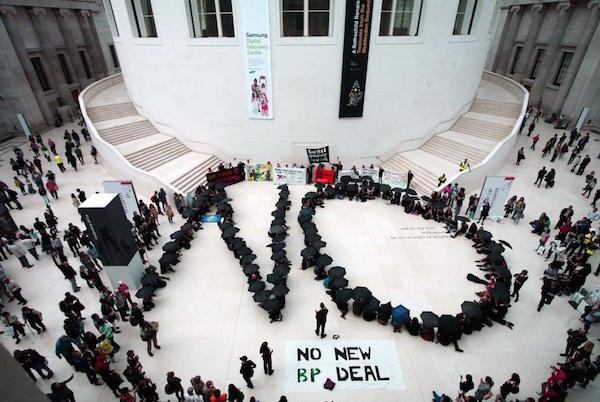
Photo: Niklas Halle’n/AFP via Art Daily
Yesterday, a group of activists contesting the art sponsorship of museums by oil companies staged large protests across four of London’s arts and culture landmark institutions.
“The protests began at 10 am in Tate Britain,” Mel Evans from Liberate Tate told artnet News. “We then moved to the National Portrait Gallery and Royal Opera House, and ended in the British Museum, where, about 3pm, about 250 campaigners, artists, and performers gathered.”
Members of over 15 groups took over the museum’s Great Court, where, among several other actions, they performed a dramatization of an oil spill as part of a “flashmob theater,” sat down on the floor forming the word “no” with black umbrellas, and carried banners reading “end oil” and “no new BP deal.”
The choice of venues is highly specific: the Guardian reports that, in December 2011, the directors of these four organizations held a joint press conference at the British Museum announcing a five-year sponsorship with oil company BP worth £10 million.
The deal will expire by the end of next year, and yesterday’s anti-oil festival, organized by several activist groups from the Art Not Oil Coalition, including Liberate Tate, Platform, and BP or not BP?, is the latest action in a long standing campaign to stop the art institutions from renewing their deals.
Yesterday’s protest began at Tate Britain, where the actor Ezra Miller (known for his portrayal of a teenage mass killer in the film We Need to Talk About Kevin and who will take the titular role in the upcoming adaptation of DC’s comic book superhero The Flash) led a performative reading of the Fifth Assessment Synthesis Report of the Intergovernmental Panel on Climate Change, a report written by hundreds of international scientists stressing the urgency of the need to act on climate change.
Miller, who has a background in durational performance art, has expressed concern on the role that oil companies are playing in exacerbating the climate change crisis. You can see a video of Miller performing here.
“Last week Tate installed solar panels on the roof of Tate Modern,” Yasmin de Silva, who took part in Sunday’s performance, said in a statement. “If the art museum recognizes the need to promote clean, renewable energy, it must also realize how incongruous it is to be so embedded with one of the dirtiest and most controversial oil companies in the world through its sponsorship relationship with BP,” she declared.
“This was our most ambitious intervention to date, and showed just how large the movement against oil sponsorship has become,” Miranda Shaw, from the Art Not Oil Coalition and curator of the protest festival, said in a stamentent.
“As the British Museum, the Tate, and others start debating whether to renew their five-year BP sponsorship deal our message to #dropBP could not be clearer. With so many other institutions cutting their ties to fossil fuels, museums and galleries must end their relationship with big oil or end up on the wrong side of history,” Shaw argued.
In January, after a bitter legal battle over a freedom of information request by Liberate Tate and Platform, Tate was forced to reveal the scale of BP’s support, disclosing that, between 1990 and 2006, it received between £150,000 and £330,000 per year from BP, a mere 0.5 percent of the institution’s annual budget.
Protesters participating in the 25-hour “textual intervention” against BP at Tate Modern in June 2015.
Photo: Martin LeSanto-Smith via The Guardian
The United Nations will hold a important climate change summit in Paris in December.
Related stories:
Climate Activists Occupy Tate Modern In Dramatic Protest Over BP Sponsorship of the Arts
Emails Reveal Shell Attempted to Influence Climate-Change Program at London’s Science Museum